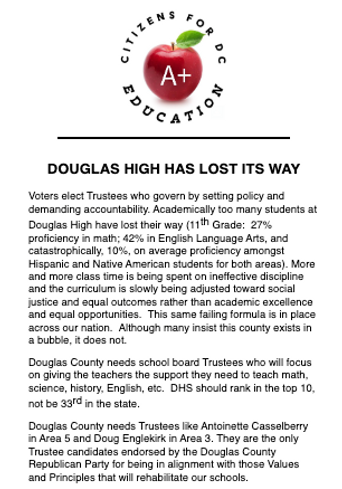Understanding ACT Test Results and What They Measure and Show
RESPONSE TO DOUGLAS HIGH ACT TESTING RESULTS
FOR IMMEDIATE RELEASE
SEPTEMBER 10th, 2024
Some politically motivated individuals in the Carson Valley community want to misrepresent the yearly results of the state-required test for all juniors, the ACT, with the overall achievement of these students. The Citizens for DC Education, founded by Tom Starrett, focuses on the proficiency rates and claim, because they appear to be low, that the vast majority of our students are not meeting state standards and that Douglas County School District must be graduating incompetent, “functionally illiterate” (Paul White, July 19, 2023), poorly prepared students.


Their claims are faulty, as shown below. But it’s more important to note first that the current school board majority has failed to place a presentation and discussion about student academic performance on an agenda since January 2023 (that’s 19 months). They have not once taken any action to advance student academic performance. This is unconscionable, and the community should reject false claims and demand that some of the trustees stop throwing out random test scores and hold a thorough review and discussion so that everyone can understand how our students are progressing academically and what we, as a school district, can do to make this even better.
In a recent posting from Citizens for DC Education, “Douglas High School Has Lost Its Way,” this PAC, registered by Tom Starrett, makes the following claims:
“Academically too many students at Douglas High have lost their way (11th Grade: 27% proficiency in math; 42% in English Language Arts, and catastrophically, 10% on average proficiency amongst Hispanic and Native American students for both areas). More and more class time is being spent on ineffective discipline and the curriculum is slowly being adjusted toward social justice and equal outcomes.”
To understand American College Testing (ACT) we need to understand the scoring framework and the purpose of the ACT: “If your score for a test was above or equal to the Benchmark [score], it means you have a 50% chance of obtaining a B or higher, or about a 75% chance of obtaining a C or higher in specific first-year college courses in the corresponding subject area.” (From the webpage, “ATC Scores: Understanding Your Scores.”) The ACT test is a predictor of potential college success, and it does not align with the Nevada State Academic Standards. For example, the ACT test covers concepts from high school courses in Algebra 1, Geometry, and Algebra 2, as well as some statistics and trigonometry. Not all students have had coursework in all of these areas. So, what the ACT test measures is at college level standards.
In addition, the ACT test is required for participation only. So, if a student in his/her junior or senior year takes the test, he/she meets the graduation requirement that satisfies the federal requirement of the Every Student Succeeds Act of 2015. Because no specific requirements exist on each subject area test or the composite score for graduation, some students simply take the test without concern for their outcomes.
An important factor to consider is that this one-day test is only required for participation and a graduation requirement in the following 11 states:
ACT test only: Alabama, Arizona, Illinois (starting 2024-2025), Kentucky, Mississippi, North Carolina, and Wyoming.
ACT test with writing: Hawaii, Montana, Nebraska, Nevada, and Wisconsin.
11 states, excluding Illinois which will begin using the ACT test with all juniors this year, require the ACT with a high percentage of junior students in their states. Douglas High School’s 2021-2022 (class of 2023) composite (average of English, math, reading, and science) was 18.1. When compared with the 11 states that require juniors to participate in the ACT test, Douglas High ranked 5th out of the 11 and was within less than a point of the next four state composite scores. This is to say that when we separate Douglas High’s composite score from the state of Nevada, which was 17.2, DHS does very well in comparison with states with similar testing requirements.
Another significant factor, though, is that Tom Starrett and the Citizens for Douglas County Education neglect to look at the Approaching Standards category. This represents students who on the reading portion of the test scored between 7 to 17, which means these students are demonstrating skills toward success in college-level coursework. In the case of reading, this is 40.7% of the test takers. This represents that 87.9% of students demonstrated a potential for high success in college courses or are approaching that standard. Likewise for math, 51% of test takers earned between 16-21 and showed growth toward success in college math courses. When combined with the 26% who scored with the potential for high success in college math, this puts these junior students at 77% of juniors approaching or achieving this standard. It is important to look at the progression of this achievement measurement and also remember that not all students as juniors have received instruction in what is assessed and that for some, motivation to do well is low.
So, specifically, when you review Douglas High School’s state assessment data in the Nevada Report Card Accountability Portal (go to Accountability Report Card and then State Assessment Results), you will find inaccuracies in what Tom Starrett’s PAC, Board President David Burns, and candidate Antoniette Casselberry have publicly purported. They claim that Hispanic students, not specifying the ACT test, only scored 10% proficiency. This is correct for math, but they fail to report that 51% are approaching standards. Also, they inaccurately report that 23% demonstrated proficiency in ELA with 54% of testers approaching standards. Worse yet, they all claim that our Native American testers demonstrated 10% proficiency. In fact, no results are reported because the testing group is smaller than 15 and, therefore, is not appropriately valid to report. So no proficiency scores on the 2023 ACT testing for Native American students at Douglas High are reported on the Report Card. It is untrue and unfair to our Native American students to claim they are failing.
Douglas County School District has other methods to assess growth and learning that far exceed the ACT test. First, all students in grades 2-9 take Measured Academic Progress tests, typically at the beginning and end of each year, and this measures student academic growth by subject over time. Teachers also utilize this information to help plan for their instruction with individuals and groups of students. Also, almost all students (unless a student moves into Douglas County late into high school) have at least six English teachers, five math teachers, five social studies teachers, and five science teachers (a total of 21 teachers) who instruct and assess student competency and performance. If students do not meet the requirements of their course work that has curriculum based on Nevada State Academic Standards, they do not graduate. In every school district, this is the single most accurate and effective method of determining student competency and future success. We are blessed in Douglas County to have outstanding teachers and staff to support their work with our students.
Lastly, the Citizens for DC Education claim that our students and teachers are losing focus on core content and curriculum: “More and more class time is being spent on ineffective discipline and the curriculum is being slowly adjusted toward social justice and equal outcomes rather than academic excellence and equal opportunity.” Yet, this group fails to provide even one example of specific courses, activities, or curriculum that limits students from accessing and being instructed in the core subject areas. We call for this group to provide specifics instead of making vague, unsubstantiated claims.
Sources:
“ATC Scores: Understanding Your Scores.” act.org. https://www.act.org/.../understanding-your-scores.html....
Douglas County School District. Administrative Regulation 515, “Promotion, Retention, and Demotion of Students;” Board Policy 515, “Promotion, Retention, and Demotion of Students;” Board Policy 518, “Graduation Requirements.” dcsd.net. https://www.dcsd.net/board/policies-and-regulations
Douglas County School District. “Nevada Diploma Requirements” and “Credit Requirements by Subject and Diploma Type.” dcsd.net. https://www.dcsd.net/departments/education-services
Edwards, Halle. “Average ACT Score by State (Most Recent).” PrepScholar.com. https://blog.prepscholar.com/act-scores-by-state-averages...
Nevada Department of Education. Nevada Report Card. “Data Interaction for Nevada Accountability Portal.” “[Douglas High School] Group Summary Report: CCR (Grade 11 High School ELA/Math), 2022-2023 ” https://nevadareportcard.nv.gov/di/report/summary_1...&
For more information, please email wedeserveabetterboard@gmail.com.
